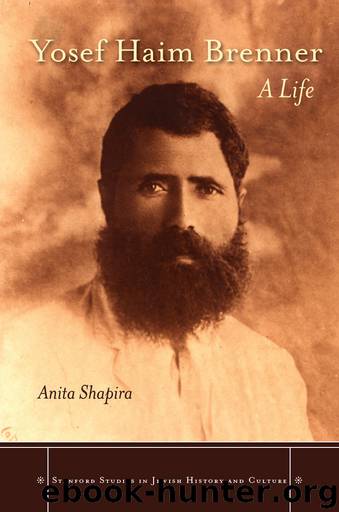Yosef Haim Brenner by Shapira Anita Berris Anthony

Author:Shapira, Anita,Berris, Anthony [Shapira, Anita]
Language: eng
Format: epub
Publisher: Stanford University Press
Published: 2014-01-02T16:00:00+00:00
Eight
Wartime, 1914–1918
The thunder of the cannons in August 1914 heralding the outbreak of war in Europe was also heard in faraway Palestine. The Yishuv was cut off from its lifelines overnight: maritime contact with the outside world was broken. Import and export came to a halt: the country was unable to market its citrus fruit and wine or import staples, such as fuel, sugar, rice, and flour. Cultural and welfare institutions, secular and religious, Zionist and anti-Zionist, suddenly found themselves without financial support, and their existence was in jeopardy. There was a run on the banks as people withdrew their deposits. Within two days the Anglo-Palestine Bank paid out a quarter of a million French francs, and the Turkish government declared a moratorium, postponing payments until after the war. Bank deposits were frozen. There was a severe shortage of gold coins, the most accepted form of payment. Turkish banknotes were severely devalued. Those who could hoarded basic staples, fearing the approaching shortages. “The situation is terrible,” Kruglyakov wrote to Brenner. “There is no credit, even for people with money in the bank. The price of food has increased drastically. The situation is grave. Nobody has any money, there are no buyers, and it is impossible to bring in merchandise, even if there were customers.”1 Inflation soared from day to day. From this point on, shortage became a frequent visitor in the homes of thousands of families. The old Yishuv, which depended on the distribution of charity, was cut off from its source of income. The new Yishuv was also hit hard, especially the city dwellers engaged in trade and crafts who depended on the import of raw material and goods. The inhabitants of the moshavot and the farms, who grew their own food, suffered much less. Hundreds of workers were fired because of the slowdown in construction and the cessation of export of agricultural produce.
In the months before the outbreak of war, Brenner received several offers of work intended to ease the young family’s financial situation and enable him to devote himself to writing. But only a month passed and the whole picture changed. The journals stopped paying. From early summer on, Brenner did not receive his salary from Hapoel Hatzair.2 When he complained to Aharonowitz that the shopkeeper was about to cut off his credit, Aharonowitz replied, describing the situation in Jaffa: “It appears from your letter that your situation is very good, [because the shopkeeper] cut off ours a long time ago. People are not giving credit anywhere, even a pruta [penny], and there is no money.”3 All the plans in the cultural realm were shelved. People were thinking solely about the immediate crisis.
At the end of September 1914, the USS North Carolina sailed into Jaffa carrying 50,000 gold coins, a donation from the Jews of the United States to the Jewish Yishuv. This was the outcome of an approach to Henry Morgenthau, the U.S. ambassador in Constantinople, by the Committee for Easing the Crisis, headed by Arthur Ruppin.
Download
This site does not store any files on its server. We only index and link to content provided by other sites. Please contact the content providers to delete copyright contents if any and email us, we'll remove relevant links or contents immediately.
| Africa | Asia |
| Canadian | Europe |
| Holocaust | Latin America |
| Middle East | United States |
Fanny Burney by Claire Harman(26593)
Empire of the Sikhs by Patwant Singh(23070)
Out of India by Michael Foss(16846)
Leonardo da Vinci by Walter Isaacson(13315)
Small Great Things by Jodi Picoult(7118)
The Six Wives Of Henry VIII (WOMEN IN HISTORY) by Fraser Antonia(5496)
The Wind in My Hair by Masih Alinejad(5085)
A Higher Loyalty: Truth, Lies, and Leadership by James Comey(4948)
The Crown by Robert Lacey(4805)
The Lonely City by Olivia Laing(4798)
Millionaire: The Philanderer, Gambler, and Duelist Who Invented Modern Finance by Janet Gleeson(4464)
The Iron Duke by The Iron Duke(4349)
Papillon (English) by Henri Charrière(4258)
Sticky Fingers by Joe Hagan(4188)
Joan of Arc by Mary Gordon(4099)
Alive: The Story of the Andes Survivors by Piers Paul Read(4017)
Stalin by Stephen Kotkin(3956)
Aleister Crowley: The Biography by Tobias Churton(3628)
Ants Among Elephants by Sujatha Gidla(3459)
